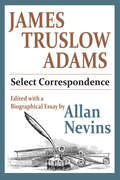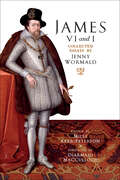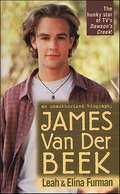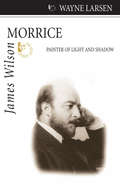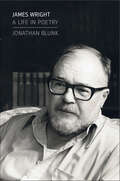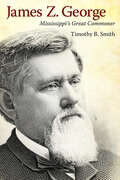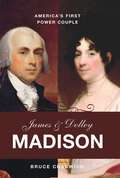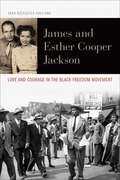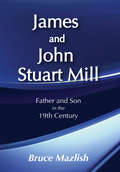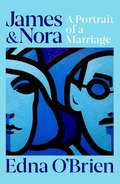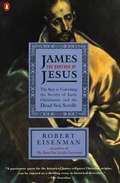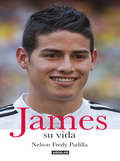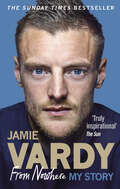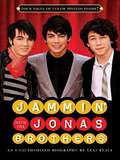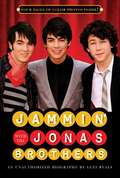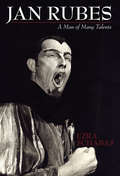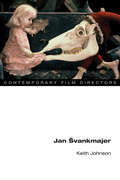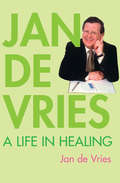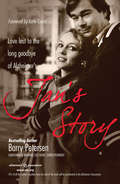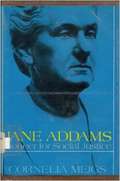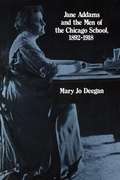- Table View
- List View
James Truslow Adams: Select Correspondence
by Allan NevinsThe brilliant historian of the mid-twentieth century, Allan Nevins, introduces this volume of correspondence by and to James Truslow Adams with a summary of his life and importance. This presents his appreciation of Adams in a manner that properly serves as a bridge to a full range of his correspondence, including a long series of letters by Adams himself.The correspondence is divided into a wide network of letters covering two world wars, and highlighting Adams' efforts to speak as a public historian of the age. The range covered extends from World War I, where he participated in the Paris Conference, to the New England histories, the year of the Economic Crash, the making of his great book, The Epic of America, and the final summing up, making history accessible to the larger publics.Both the biographical sketch and the correspondence reflect Adams as possessing a nimble, precise mind and a stubborn set of opinions that are sometimes liberal, while at other times conservative. Despite a lifetime of public service, Nevins and the letters remind us, Adams was and remained essentially a scholar. The same can be said of Nevins himself and that made him the perfect spokesman and student of Adams' writings. For those to whom the meshing of solid American history and public service are of interest this will be an unusual, but entirely worthwhile experience.
James VI and I: Collected Essays
by Jenny WormaldThe renowned historian Jenny Wormald was a ground-breaking expert on early modern Scottish history, especially Stewart kingship, noble power and wider society. She was most controversial in her book-length critique of Mary, Queen of Scots. Unfortunately, Jenny never got round to producing a similar monograph on a monarch she was infinitely more fond of, King James VI and I, before her untimely death in 2015. In the absence of such a book, this volume brings together all the major essays by Jenny on James. She wrote on almost every aspect and every major event of James' reign, from the famous Gunpowder Plot, the Plantation of Ulster, the Gowrie Conspiracy, to the witchcraft panics, as well as James' extensive writings. She wrote extensively on James' Scottish rule, but she was also keenly interested in James as the first king of all of Britain, and many of her essays unpick the issues surrounding the Union of the Crowns and James' rule over all three of his kingdoms. This book is an invaluable resource for any scholar on this crucial time in the history of the British Isles.
James Van Der Beek: An Unauthorized Biography
by Leah Furman Elina FurmanNo wonder this sexy, shy-guy actor is landing the coolest roles in young Hollywood--from Dawson Leery on the WB's Dawson's Creek to quarterback Jonathan "Mox" Moxon in the hit movie Varsity Blues--he's got that aw-shucks, guy-next-door irresistibility (not to mention those baby blue eyes!). James Van Der Beek also happens to be a talented actor who wowed the DC creators with his brilliant audition for the part of the sensitive, introspective Dawson. Now, in this revealing biography, you can get the lowdown on this hot young celebrity, including:What his life is like behind the scenes and off-cameraHow James got his start in actingWhere he plans to go with his budding careerWhat kind of girls he likesAnd much, much more!
James Wilson Morrice: Painter of Light and Shadow
by Wayne LarsenJames Wilson Morrice (1865–1924) was a Canadian painter of extraordinary passion and simplicity whose canvases and oil sketches are valued throughout the world and cherished in Canada as our first real examples of modern art.Though cut short by chronic alcohol abuse, Morrice’s restless bohemian life was spent in constant motion. From the colourful canals of Venice to the sun-drenched markets of North Africa to the snowy streets of Quebec City, he was, as his friend Henri Matisse described him, "always over hill and dale, a little like a migrating bird but without any very fixed landing place."In James Wilson Morrice, Wayne Larsen chronicles the creative but often troubled life of this early cultural icon as he travels in search of the colours, compositions, and subtle effects of light that would inspire a revolution in Canadian art.
James Wright: A Life in Poetry
by Jonathan BlunkThe authorized and sweeping biography of one of America’s most complex, influential, and enduring poetsIn the extraordinary generation of American poets who came of age in the middle of the twentieth century, James Wright (1927–1980) was frequently placed at the top of the list. With a fierce, single-minded devotion to his work, Wright escaped the steel town of his Depression-era childhood in the Ohio valley to become a revered professor of English literature and a Pulitzer Prize winner. But his hometown remained at the heart of his work, and he courted a rough, enduring muse from his vivid memories of the Midwest. A full-throated lyricism and classical poise became his tools, honesty and unwavering compassion his trademark.Using meticulous research, hundreds of interviews, and Wright’s public readings, Jonathan Blunk’s authorized biography explores the poet’s life and work with exceptional candor, making full use of Wright’s extensive unpublished work—letters, poems, translations, and personal journals. Focusing on the tensions that forced Wright’s poetic breakthroughs and the relationships that plunged him to emotional depths, Blunk provides a spirited portrait, and a fascinating depiction of this turbulent period in American letters.A gifted translator and mesmerizing reader, Wright appears throughout in all his complex and eloquent urgency. Discerning yet expansive, James Wright will change the way the poet’s work is understood and inspire a new appreciation for his enduring achievement.
James Z. George: Mississippi’s Great Commoner
by Timothy B. Smith“When the Mississippi school boy is asked who is called the ‘Great Commoner’ of public life in his state," wrote Mississippi’s premier historian Dunbar Rowland in 1901, “he will unhesitatingly answer James Z. George.” While George’s prominence, along with his white supremacist views, have decreased through the decades since then, many modern historians still view him as a supremely important Mississippian, with one writing that George (1826–1897) was “Mississippi's most important Democratic leader in the late nineteenth century.” Certainly, the Mexican War veteran, prominent lawyer and planter, Civil War officer, Reconstruction leader, state Supreme Court chief justice, and Mississippi’s longest-serving United States senator to that time deserves a full biography. And George’s importance was greater than just on the state level as other southerners copied his tactics to secure white supremacy in their own states. That James Z. George has never had a full, academic biography is inexplicable. James Z. George: Mississippi’s Great Commoner seeks to rectify the lack of attention to George’s life. In doing so, this volume utilizes numerous sources, never or only slightly used, primarily a large collection of George’s letters held by his descendants and never used by historians. Such wonderful sources allow a glimpse not only into the life and times of James Z. George, but perhaps more importantly an exploration of the man himself, his traits, personality, and ideas. The result is a picture of an extremely commonplace individual on the surface, but an exceptionally complicated man underneath. James Z. George: Mississippi’s Great Commoner will bring this important Mississippi leader of the nineteenth century back into the minds of twenty-first-century Mississippians.
James and Dolley Madison: America's First Power Couple
by Bruce ChadwickThis revealing new portrait of James and Dolley Madison introduces the reader to America's first power couple. Using recently uncovered troves of letters at the University of Virginia, among other sources, historian Bruce Chadwickhas been able to reconstruct the details of the Madisons' personal and political lives. Chadwick argues that Madison was not a boring, average president, as other historians have characterized him, but a vibrant, tough leader-and a very successful commander in chief in the War of 1812. He contends that Madison, the architect of the Constitution, owed much of his success to the political savvy of his charismatic, much younger wife, whose parties and backdoor politicking make for remarkable stories. And Dolley, through her many social skills, created the dynamic role of First Lady that we know today. Despite their glamorous lifestyle, behind the scenes, the Madisons struggled with family drama: James and Dolley's constant funding of their charming but sociopathic son's misadventures ultimately led to their own financial ruin. Blending the personal and the political, this is a fascinating profile of a couple whose life together contributed so much to the future course of our nation.
James and Esther Cooper Jackson: Love and Courage in the Black Freedom Movement (Civil Rights and the Struggle for Black Equality in the Twentieth Century)
by Sara Rzeszutek HavilandThis dual biography “examines the ideas and activism of two of the most committed and significant freedom fighters in twentieth-century America” (Erik Gellman, author of Death Blow to Jim Crow).Growing up in Virginia during the Great Depression, James E. Jackson and Esther Cooper Jackson understood that opportunities came differently for blacks and whites, men and women, rich and poor. They devoted their lives to the black freedom movement and saw a path to racial equality through the Communist Party. This political affiliation would come to define not only their activism but also the course of their marriage as the Cold War years unfolded.In this dual biography, Sara Rzeszutek examines the couple's political involvement as well as the evolution of their personal and public lives in the face of ever-shifting contexts. She documents the Jacksons' contributions to the early civil rights movement, discussing their time leading the Southern Negro Youth Congress, which laid the groundwork for youth activists in the 1960s; their writings in periodicals such as Political Affairs; and their editorial involvement in The Worker and the civil rights magazine Freedomways.Drawing upon correspondence, organizational literature, and interviews with the Jacksons themselves, Haviland presents a portrait of a remarkable pair who lived during a transformative period of American history. Their story offers a vital narrative of persistence, love, and activism across the long arc of the black freedom movement.
James and John Stuart Mill
by Bruce MazlishThe story of James and John Stuart Mill is one of the great dramas of the 19thcentury. In the tense yet loving struggle of this extraordinarily influential father and son, we can see the genesis of evolution of Liberal ideas-about love, sex, and women, wealth and work, authority and rebellion-which ushered in the modern age. The result of more than a decade of research and reflection, this is a study of the relationship between James Mill, the self-made utilitarian philosopher who tried (with only partial success) to shape his son in his own image. Mazlish integrates psychology and intellectual history as part of his larger and continuing effort to spur deeper understanding of the character, limitations, and possibilities of the social sciences.John Stuart Mill's rebellion against a joyless, loveless upbringing, one in strict accordance with the principles of Utilitarianism, was rooted ina powerful Oedipal struggle against his father's authority. Mazlish describes this rebellion as playing an important role in the genesis of classical nineteenth century liberalism. Behind this intellectual development were the women in Mills' life: Harriet the mother, never mentioned by her son in his autobiography, and Harriet Taylor, with whom Mill lived in a scandalous, if chaste, ménage a trois. It was this long relationship which informed his famous essay 'The Subjection of Women,' one of the most eloquent feminist statements ever written. A work of brilliant historical research and psychological insights, James and John Stuart Mill shows how the nineteenth-century struggle of fathers and sons shaped the social transformation of society.
James and Nora
by Edna O'BrienIt was June 10th, Barnacle Day. He saw her in Nassau Street and they stopped to talk. She thought his blue eyes were those of a Norseman. He was twenty-two, and she, Nora Barnacle, was twenty and employed as a chambermaid in Finn's Hotel. They agreed to meet on June 14th, outside No. 1 Merrion Square, the home of Sir William Wilde, but Nora did not turn up. After a dejected letter from Joyce they met on June 16th, a date which came to be immortalized in literature as Bloomsday.Edna O'Brien paints a miniature portrait of an artist, idealist, insurgent and filled with a secret loneliness. In Nora, he was to find accomplice, collaborator and muse. For all their sexual escalations, Joyce considered their relationship 'a kind of sacrament'. Their life was one of wandering, emotional upheaval and poverty. It was also one that was binding and mysterious, and defied all the mores of intimacy.In prose brimming with life and energy, Edna O'Brien resurrects a relationship of magnificent intensity on the page, and in doing so shows herself to be touched by the genius of the writer she loves above all others.
James the Brother of Jesus
by Robert H. EisenmanJames was a vegetarian, wore only linen clothing, bathed daily at dawn in cold water, and was a life-long Nazirite. In this profound and provocative work of scholarly detection, eminent biblical scholar Robert Eisenman introduces a startling theory about the identity of James--the brother of Jesus, who was almost entirely marginalized in the New Testament. Drawing on long-overlooked early Church texts and the Dead Sea Scrolls, Eisenman reveals in this groundbreaking exploration that James, not Peter, was the real successor to the movement we now call "Christianity." In an argument with enormous implications, Eisenman identifies Paul as deeply compromised by Roman contacts. James is presented as not simply the leader of Christianity of his day, but the popular Jewish leader of his time, whose death triggered the Uprising against Rome--a fact that creative rewriting of early Church documents has obscured. Eisenman reveals that characters such as "Judas Iscariot" and "the Apostle James" did not exist as such. In delineating the deliberate falsifications in New Testament dcouments, Eisenman shows how--as James was written out--anti-Semitism was written in. By rescuing James from the oblivion into which he was cast, the final conclusion of James the Brother of Jesus is, in the words of The Jerusalem Post, "apocalyptic" --who and whatever James was, so was Jesus.
James the Brother of Jesus: The Key to Unlocking the Secrets of Early Christianity and the Dead Sea Scrolls
by Robert H. EisenmanJames was a vegetarian, wore only linen clothing, bathed daily at dawn in cold water, and was a life-long Nazirite. In this profound and provocative work of scholarly detection, eminent biblical scholar Robert Eisenman introduces a startling theory about the identity of James-the brother of Jesus, who was almost entirely marginalized in the New Testament.Drawing on long-overlooked early Church texts and the Dead Sea Scrolls, Eisenman reveals in this groundbreaking exploration that James, not Peter, was the real successor to the movement we now call "Christianity." In an argument with enormous implications, Eisenman identifies Paul as deeply compromised by Roman contacts. James is presented as not simply the leader of Christianity of his day, but the popular Jewish leader of his time, whose death triggered the Uprising against Rome-a fact that creative rewriting of early Church documents has obscured.Eisenman reveals that characters such as "Judas Iscariot" and "the Apostle James" did not exist as such. In delineating the deliberate falsifications in New Testament dcouments, Eisenman shows how-as James was written out-anti-Semitism was written in. By rescuing James from the oblivion into which he was cast, the final conclusion of James the Brother of Jesus is, in the words of The Jerusalem Post, "apocalyptic" -who and whatever James was, so was Jesus.
James, su vida
by Nelson Freddy PadillaLa biografía de uno de los mejores jugadores colombianos de fútbol de los últimos tiempos. Después de entrevistar a más de 60 personas entre amigos, familiares, entrenadores y jugadores cercanos a James Rodríguez, recoger decenas de fotografías desde su infancia y de recorrer sus pasos, Nelson Fredy Padilla, autor de este libro, logra reconstruir con la minucia de un detective privado la vida de un niño que muy rápido se hizo hombre y que hoy hace parte del más selecto grupo de jugadores de élite internacional. Este libro es la confirmación de que en el fútbol, a la perseverancia, al sacrificio y al talento innato a veces le siguen la fama y felicidad absolutas..La vida de James está llena de gloria y esfuerzo y por eso todavía sus amigos recuerdan el día que su profesor de matemáticas lo regañó y le dijo: 'Acuérdese de que tiene que educar se porque usted es el hombre de la casa. O es que piensa vivir del fútbol'. Ante lo que James respondió: 'Sí señor. Amo el fútbol y voy a vivir del fútbol'
Jamie Dornan: Shades of Desire
by Alice MontgomeryThe first, intimate biography of Jamie Dornan as he takes on one of the most iconic characters in fiction - Christian Grey.Jamie Dornan is about to become the hottest sex symbol on the planet after landing the leading role in the Fifty Shades of Grey movies. But he remains almost as enigmatic as Mr Grey himself.Jamie Dornan: Shades of Desire will reveal everything fans want to know about the mysterious Mr Dornan, from his tragic childhood to his career as a Calvin Klein model, dating Keira Knightley to finding love with his wife Amelia Warner. How does his part as a BDSM-loving billionaire sit alongside his real life role as a family man and father to a young daughter? And how will he cope with fame as the Fifty Shades of Grey films launch him into superstardom?This biography will be the first to show what Jamie Dornan is really like behind closed doors.
Jamie McMurray (Nascar Champions)
by Connor DaytonA brief profile of NASCAR driver Jamie McMurray that examines his life and career.
Jamie Vardy: From Nowhere, My Story
by Jamie VardyThe Sunday Times Bestseller and Number 1 Sport Book of 2016'A tale that's truly inspirational' The SunAn ordinary lad from Sheffield, Jamie Vardy has become known as an against-the-odds footballing hero the world over. Yet a few years ago, things couldn’t have been any more different. Rejected as a teenager by his boyhood club, Jamie thought his chance was gone. But from playing pub football and earning £30 a week at Stocksbridge Park Steels, while still working in a factory, his off-the-cuff performances saw him rise.Jamie had a wild and turbulent youth, but football became his saving grace and, once he filled his boots with goals at FC Halifax Town and Fleetwood Town, he moved to Leicester City. After the miracle of surviving relegation, the team of unlikely outsiders bonded together to achieve the unthinkable: Jamie set the record as the first player to score in 11 consecutive Premier League matches and Leicester beat odds of 5000-1 to become champions.Jamie has now been nominated for the Ballon d’Or, firmly establishing himself as one of England’s leading goal scoring footballers. Not forgetting his roots, however, he has set up the V9 Academy in a bid to find the next big talent from non-league football. Defying all expectations, this is the story of the boy from nowhere who reached the top in his own unflinching, honest words.
Jammin' with the Jonas Brothers
by Lexi RyalsThese brothers are already a tween sensation!Girls can't get enough of these adorable boys who have recorded two successful albums, guest starred on Disney's Hannah Montana, are special guests on Miley Cyrus's Best of Both Worlds Tour, and have just filmed a pilot for a Disney Channel series. We've got the inside scoop on these crooning cuties from their younger years to their current star status-complete with four pages of color photos!
Jammin' with the Jonas Brothers: An Unauthorized Biography
by Lexi RyalsThese brothers are already a tween sensation! Girls can't get enough of these adorable boys who have recorded two successful albums, guest starred on Disney's Hannah Montana, are special guests on Miley Cyrus's Best of Both Worlds Tour, and have just filmed a pilot for a Disney Channel series. We've got the inside scoop on these crooning cuties from their younger years to their current star status.
Jan Rubes: A Man of Many Talents
by Ezra SchabasJan Rubes has been a leading performer and director on stage, film, and TV, and in concert, opera, musical comedy, and drama. With an operatic career already established, the Czechoslovakia native immigrated to Canada in 1949 and was soon the leading bass in the Canadian Opera Company. He has performed throughout Canada and the U.S. both with the company and in countless solo recitals and appearances with symphony orchestras. Rubes has done more than 100 operatic roles and has appeared in more than 70 films, including the well-remembered Witness with Harrison Ford. With his wife, Susan Douglas Rubes, he helped develop Young People’s Theatre in Toronto. A member of the Order of Canada and holder of two honourary doctorates, he has won Geminis for his film work. His life is rich in detail – he has been both a national tennis champion and an important part of the history of the performing arts in Canada.
Jan Svankmajer (Contemporary Film Directors)
by Keith Leslie JohnsonJan Svankmajer enjoys a curious sort of anti-reputation: he is famous for being obscure. Unapologetically surrealist, Svankmajer draws on the traditions and techniques of stop-motion animation, collage, montage, puppetry, and clay to craft bizarre filmscapes. If these creative choices are off-putting to some, they have nonetheless won the Czech filmmaker recognition as a visionary animator. Keith Leslie Johnson explores Svankmajer's work as a cinema that spawns new and weird life forms ”hybrids of machine, animal, and non-organic materials like stone and dust. Johnson's ambitious approach unlocks access to the director's world, a place governed by a single, uncanny order of being where all things are at once animated and inert. For Svankmajer, everything is at stake in every aspect of life, whether that life takes the form of an object, creature, or human. Sexuality, social bonds, religious longings ”all get recapitulated on the stage of inanimate things. In Johnson's view, Svankmajer stands as the proponent of a biopolitical, ethical, and ecological outlook that implores us to reprogram our relationship with the vital matter all around us, including ourselves and our bodies.
Jan de Vries: A Life in Healing
by Jan de VriesJan de Vries: A Life in Healing is the complete life story of the world-renowned health guru. It recounts his journey from childhood in wartime Holland through an amazing 50-year career, during which he has earned a global reputation as a leader in the field of alternative medicine.De Vries has encountered many obstacles in his fight to achieve recognition for the benefits of alternative medicine and he was once even threatened with imprisonment. Throughout these struggles he has remained true to his principles and his success can be measured by the large number of conventional doctors who have come to support his work.In this extraordinary autobiography, de Vries also looks back over his long and fruitful working relationship with Alfred Vogel, the famous Swiss naturopath. De Vries was the only person to whom Vogel taught his unique healing methods and he shares many of the secrets and methods he learned from this remarkable man.Jan de Vries has helped hundreds of thousands of patients during his long career and in this absorbing account he includes invaluable advice for daily living and achieving good physical, mental and spiritual health.
Jan's Story
by Katie Couric Barry PetersenWhen CBS News Correspondent Barry Petersen married the love of his life twenty-five years ago, he never thought his vow, "until death do us part," would have an expiration date. But Early Onset Alzheimer's claimed Jan Petersen, Barry's beautiful wife, at 55, leaving her unable to remember Barry or their life together.
Jane Addams Pioneer of Social Justice
by Cornelia MeigsJane Addams, the first women to receive the Nobel Peace prize, was a vivid example of the influence that can be achieved through courage, perseverance, personal integrity and respect for others regardless of social status. Not only is this book an interesting historical narrative, but it carefully reminds the reader of unsuitable urban living and working conditions of the past as it traces the development of social attitudes now taken for granted.<P><P> Jane Addams Children’s Book Award Winner
Jane Addams and Hull House (Cornerstones of Freedom)
by Deborah KentA biography of the social worker who defended the oppressed, promoted education for the poor, worked for world peace, and founded Hull Houses, a settlement house in the industrial slums of Chicago.
Jane Addams and the Men of the Chicago School, 1892-1918
by Mary Jo DeeganJane Addams is well known for her leadership in urban reform, social settlements, pacifism, social work, and women’s suffrage.The men of the Chicago School are well known for their leadership in founding sociology and the study of urban life.What has remained hidden however, is that Jane Addams played a pivotal role in the development of sociology and worked closely with the male faculty at the Department of Sociology at the University of Chicago.
